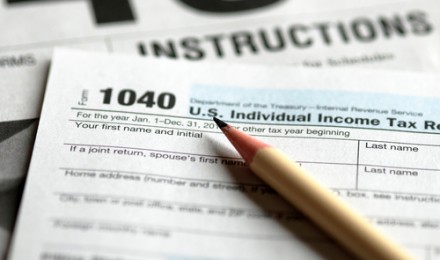With a little less than four months left in the calendar year, you may feel that it’s too early to think about tax season. This might be the case if you’re anticipating a return this year. However, if your employer didn’t withhold enough taxes during the year, or if you’re self-employed and typically owe money, the time to think about how to lower your taxes is now.
There’s nothing fun about getting hit with a large tax bill. But if you make these moves before the end of the year, you might be able to reduce how much you owe.
1. Increase your business expenses
If you run your own business and desperately need new office equipment, don’t wait until the beginning of the new year to stock up – now’s the time. You can deduct the cost of all qualifying equipment purchased in 2013, as long as 51% of its use is for business. And in most cases, you can deduct the depreciated value of business equipment on your future tax returns. Qualifying business expenses include the cost of computers, furniture, company cars, supplies, and other office equipment. Make sure that you keep all receipts. If you’re audited, the IRS wants to see proof of these purchases.
2. Establish an IRA
It’s never too early or too late to plan for retirement. If you’re self-employed without any type of retirement, or if you’re looking to supplement an employer-sponsored retirement plan, there’s no better time to open a traditional IRA.
The maximum you can contribute to a traditional IRA in 2013 is $5,500 ($6,500 if you’re over the age of 50). Since contribution are tax-deductible, you can plan for retirement while lowering your tax obligation. But this isn’t the only good news. To deduct contribution on your 2013 tax return, the IRS gives you up until the April deadline to open and fund an account. Therefore, if you can’t get the account up and running by December 31, there’s a 3 1/2 month window.
3. Start a Health Savings Account
Medical costs can be a beast, even with health insurance. And if you have a high-deductible health insurance plan, you could end up paying a lot out-of-pocket for medical expenses. Talk to your employer or bank about starting a Health Savings Account (HSA).
This account is used in conjunction with a high-deductible health insurance plan. Make regular deposits and then invest account funds in stocks, bonds, CDs and mutual funds. Grow your money tax-free and use earnings to pay for future medical costs. Establish and contribute to your account by December 31 and you’re able to write-off your contributions. For 2013, singles and married couples can contribute up to $3,250 and $6,450, respectively.
4. Give to your favorite charity
There is certainly more joy in giving to others, but this doesn’t mean you shouldn’t be happy about writing off charitable donations Donate property, money and personal items to a charity by the end of the year and you’ll reduce how much you owe in taxes. Keep receipts and records for all donations made throughout the year.
5. Pay your mortgage early
Don’t wait until January 1 to make your first mortgage payment of the new year. If you need to lower your taxes before the end of the year, and you’re looking for additional deductions, make your January mortgage payment on December 31. The bank records the transaction in 2013, which lets you deduct an extra month of mortgage interest.
With a little less than four months left in the calendar year, you may feel that it’s too early to think about tax season. This might be the case if you’re anticipating a return this year. However, if your employer didn’t withhold enough taxes during the year, or if you’re self-employed and typically owe money, the time to think about how to lower your taxes is now.
There’s nothing fun about getting hit with a large tax bill. But if you make these moves before the end of the year, you might be able to reduce how much you owe.
1. Increase your business expenses
If you run your own business and desperately need new office equipment, don’t wait until the beginning of the new year to stock up – now’s the time. You can deduct the cost of all qualifying equipment purchased in 2013, as long as 51% of its use is for business. And in most cases, you can deduct the depreciated value of business equipment on your future tax returns. Qualifying business expenses include the cost of computers, furniture, company cars, supplies, and other office equipment. Make sure that you keep all receipts. If you’re audited, the IRS wants to see proof of these purchases.
2. Establish an IRA
It’s never too early or too late to plan for retirement. If you’re self-employed without any type of retirement, or if you’re looking to supplement an employer-sponsored retirement plan, there’s no better time to open a traditional IRA.
The maximum you can contribute to a traditional IRA in 2013 is $5,500 ($6,500 if you’re over the age of 50). Since contribution are tax-deductible, you can plan for retirement while lowering your tax obligation. But this isn’t the only good news. To deduct contribution on your 2013 tax return, the IRS gives you up until the April deadline to open and fund an account. Therefore, if you can’t get the account up and running by December 31, there’s a 3 1/2 month window.
3. Start a Health Savings Account
Medical costs can be a beast, even with health insurance. And if you have a high-deductible health insurance plan, you could end up paying a lot out-of-pocket for medical expenses. Talk to your employer or bank about starting a Health Savings Account (HSA).
This account is used in conjunction with a high-deductible health insurance plan. Make regular deposits and then invest account funds in stocks, bonds, CDs and mutual funds. Grow your money tax-free and use earnings to pay for future medical costs. Establish and contribute to your account by December 31 and you’re able to write-off your contributions. For 2013, singles and married couples can contribute up to $3,250 and $6,450, respectively.
4. Give to your favorite charity
There is certainly more joy in giving to others, but this doesn’t mean you shouldn’t be happy about writing off charitable donations Donate property, money and personal items to a charity by the end of the year and you’ll reduce how much you owe in taxes. Keep receipts and records for all donations made throughout the year.
5. Pay your mortgage early
Don’t wait until January 1 to make your first mortgage payment of the new year. If you need to lower your taxes before the end of the year, and you’re looking for additional deductions, make your January mortgage payment on December 31. The bank records the transaction in 2013, which lets you deduct an extra month of mortgage interest.







